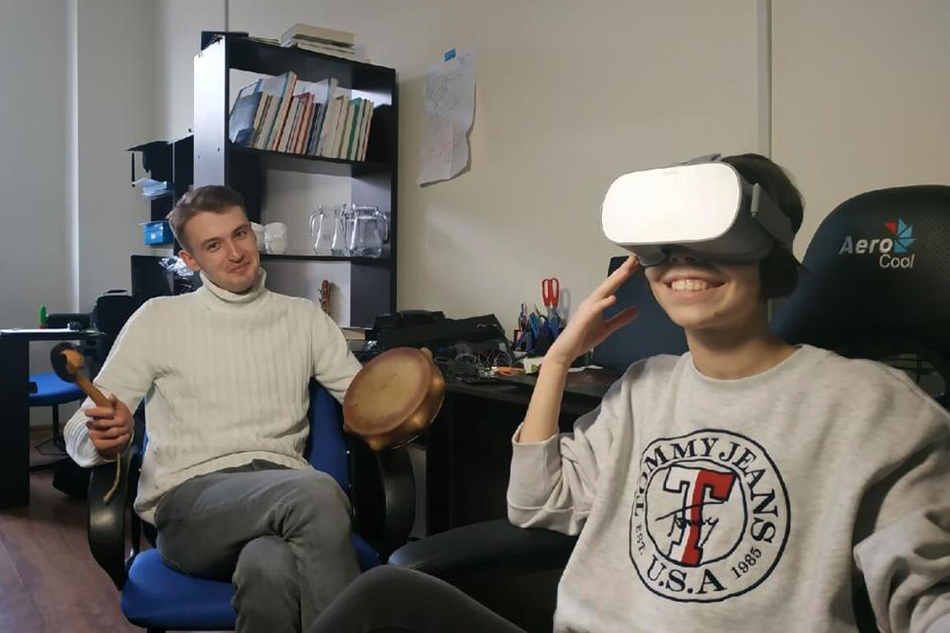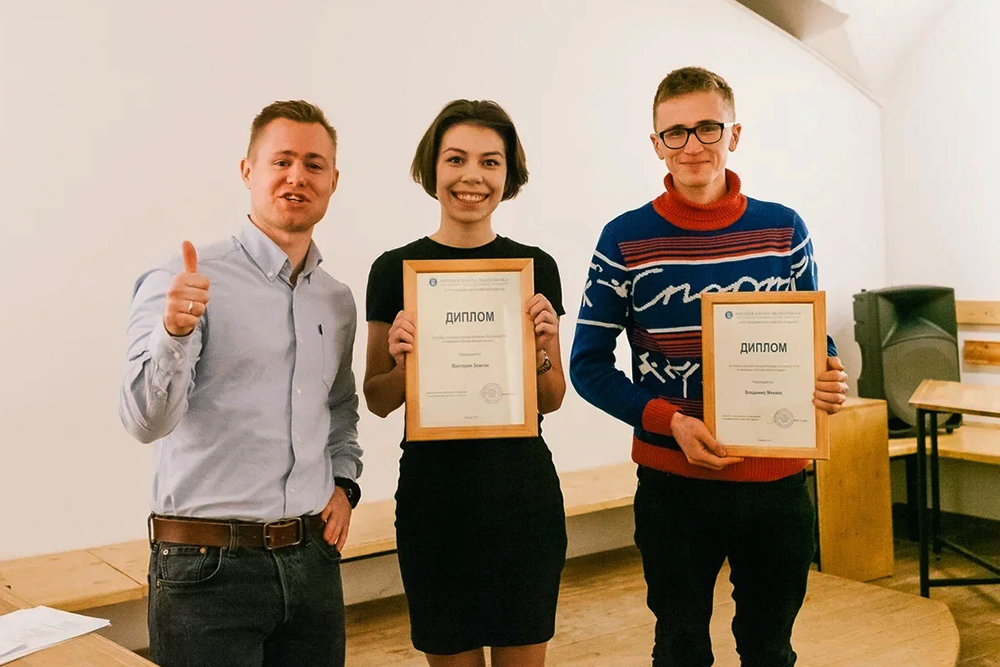‘We Want to Talk About How the Human Brain and Machine Intelligence Work’

In a competition for science bloggers held at HSE University, Vladimir Mikheev and Vikotria Zemlyak were among the top performers. The students of the English-taught Master’s programme ‘Cognitive Sciences and Technologies: From Neuron to Cognition’ produce ‘Neirochai’ (‘NeuroTea’), a science podcast. The duo spoke with the HSE News Service about their guests, their listeners and their future plans.
How did you come up with the idea to create a podcast? And why? Were you looking for another way to spend your time?
Vladimir: I am engaged in an interesting area—the study of the human brain. I always wanted to tell other people about my findings. When Vika and I heard about the podcast contest, we jumped at the opportunity.
But does it take a lot of time and effort?
Vladimir: Yes. I very well might not receive a red diploma because of this podcast. But it gives me something else that is no less important: I can talk with experts face-to-face and talk about what I care about. Anything is hard to do alone. The podcast seems to be something light and fun, but we have invested a lot of work in it together. I doubt that we would have accomplished what we have working individually.
Victoria: The idea came to us randomly. My wifi wasn’t working, and I was clicking on a page over and over. When the internet started working again, I accidentally ended up on the registration page for the science blogger competition. I used to work in radio at another HSE campus. I liked the process of preparing for an episode, recording and working in the studio. And the podcast was a chance to return to something I loved. But it does take up a lot of time. Working together makes it easier and more interesting.
 Vikotria Zemlyak and Vladimir Mikheev with winner certificates
Vikotria Zemlyak and Vladimir Mikheev with winner certificates
What’s your target audience? And is it easy to find guests who can easily maintain a substantive conversation for a long time?
Vladimir: We want to talk about how the human brain and machine intelligence work, so we invite some guests from cognitive and neuroscience and others from programming. It’s ideal when guests are well versed in both areas. Before the episode, we conduct a kind of background check; we listen to how our guest speaks and conducts him or herself in public forums. We try to invite professionals who are good speakers. Those who are engaged in breakthrough things can usually speak well. For the time being, a large part of our audience are people directly connected with the cognitive sciences. But we hope to get beyond the limits of this immediate circle and reach people who are fascinated by the brain in general.
Victoria: At first, we didn’t really know who would listen to us. We were guided by what we ourselves found interesting and drew up a rough plan for ten episodes. We searched through people in labs and research centers we knew. We wrote down their names, looked at their publications and their webpages. Now the podcast is a part of our lives and when I meet an interesting lecturer at a conference or school, I immediately think about whether we should invite them to our podcast. You can engage any introvert in conversation if you are talking about something they find interesting.
When recording the podcast, do you let the guest determine the course of the conversation? Or do you keep to a certain framework, focusing on what you personally find interesting?
Victoria: We always have a clear list of questions that we follow during the interview. We send it to the guest in advance so that they can prepare.
Vladimir: This is very important. Listening to scientific explanations is already difficult, so if the interview isn’t structured, it just turns into a jumble of words. Whenever a guest mentions a new term, we always make sure they explain it, so that the listener can follow with ease.
You probably studied various other scientific podcasts when you were conceiving your own. Did you find models exhibiting a standard that you wanted to meet?
Vladimir: We wanted to avoid abstruse lectures like those in ‘Postnauka’ (‘Post-Science’). Conversations about science should be engaging, where the participants can joke and ask questions, be surprised or become inspired. What wanted to address topics that are often glossed over in projects like this: the career prospects of scientists, unethical scientific practices, how to be successful in science or in tech business. Out of the science podcasts that are out there, I like ‘Medach’ (__) and ‘Kritmysh’’ (‘Crit-Mouse’). They are about research as well as the daily sorrows and joys of both scientists and ordinary people.
Victoria: You can emulate not only scientific podcasts. For example, we both listen to Medusa. I like the way several hosts interact there. Their disputes, discussions, and comments during the episode—all of these are great ways to present information in a more lively and interesting way.
How often do you plan to record your podcast episodes? What are the next topics and guests?
Vladimir: We have three episodes ready so far, and we are planning to record ten. That will round out our first season. If things go well, we’ll continue. We try to do one episode every two weeks, and we more or less make it work.
Have you gotten any feedback from listeners yet?
Vladimir: We are responsive to criticism and try to find out what our listeners liked or didn’t like.
Victoria: There is also indirect feedback, like the number of subscribers, likes, and listens. We try to remember new subscribers, see which issues are more interesting for them. Sometimes we study their pages in order to better know our audience. One of our first subscribers who was not one of our friends and acquaintances was a little girl. Her VKontakte profile is called Escobar's Cat, and she is interested in science and posts photos with nature and kittens. When a complex term or theory appears in an episode, we try to explain it in such a way that every listener can understand. We are listened to by children whom we can attract and engage with science, and this is very good feedback.
Admissions to Master’s programme in Cognitive Sciences and Technologies are open. International students can apply online. To learn more about HSE University, its admission process, or life in Moscow, please visit International Admissions website, or contact the Education & Training Advisory Centre at: inter@hse.ru, or via WhatsApp at: +7 (916) 311 8521.
See also:
Scientists Discover That the Brain Responds to Others’ Actions as if They Were Its Own
When we watch someone move their finger, our brain doesn’t remain passive. Research conducted by scientists from HSE University and Lausanne University Hospital shows that observing movement activates the motor cortex as if we were performing the action ourselves—while simultaneously ‘silencing’ unnecessary muscles. The findings were published in Scientific Reports.
Russian Scientists Investigate Age-Related Differences in Brain Damage Volume Following Childhood Stroke
A team of Russian scientists and clinicians, including Sofya Kulikova from HSE University in Perm, compared the extent and characteristics of brain damage in children who experienced a stroke either within the first four weeks of life or before the age of two. The researchers found that the younger the child, the more extensive the brain damage—particularly in the frontal and parietal lobes, which are responsible for movement, language, and thinking. The study, published in Neuroscience and Behavioral Physiology, provides insights into how age can influence the nature and extent of brain lesions and lays the groundwork for developing personalised rehabilitation programmes for children who experience a stroke early in life.
Scientists Uncover Why Consumers Are Reluctant to Pay for Sugar-Free Products
Researchers at the HSE Institute for Cognitive Neuroscience have investigated how 'sugar-free' labelling affects consumers’ willingness to pay for such products. It was found that the label has little impact on the products’ appeal due to a trade-off between sweetness and healthiness: on the one hand, the label can deter consumers by implying an inferior taste, while on the other, it signals potential health benefits. The study findings have been published in Frontiers in Nutrition.
Internal Clock: How Heart Rate and Emotions Shape Our Perception of Time
Our perception of time depends on heart rate—this is the conclusion reached by neuroscientists at HSE University. In their experiment, volunteers watched short videos designed to evoke specific emotions and estimated each video's duration, while researchers recorded their heart activity using ECG. The study found that the slower a participant's heart rate, the shorter they perceived the video to be—especially when watching unpleasant content. The study has been published in Frontiers in Psychology.
Scientists Develop New Method to Detect Motor Disorders Using 3D Objects
Researchers at HSE University have developed a new methodological approach to studying motor planning and execution. By using 3D-printed objects and an infrared tracking system, they demonstrated that the brain initiates the planning process even before movement begins. This approach may eventually aid in the assessment and treatment of patients with neurodegenerative diseases such as Parkinson’s. The paper has been published in Frontiers in Human Neuroscience.
HSE Scientists Test New Method to Investigate Mechanisms of New Word Acquisition
Researchers at the HSE Centre for Language and Brain were among the first to use transcranial alternating current stimulation to investigate whether it can influence the acquisition of new words. Although the authors of the experiment have not yet found a link between brain stimulation and word acquisition, they believe that adjusting the stimulation parameters may yield different results in the future. The study has been published in Language, Cognition and Neuroscience.
When Thoughts Become Movement: How Brain–Computer Interfaces Are Transforming Medicine and Daily Life
At the dawn of the 21st century, humans are increasingly becoming not just observers, but active participants in the technological revolution. Among the breakthroughs with the potential to change the lives of millions, brain–computer interfaces (BCIs)—systems that connect the brain to external devices—hold a special place. These technologies were the focal point of the spring International School ‘A New Generation of Neurointerfaces,’ which took place at HSE University.
How the Brain Responds to Prices: Scientists Discover Neural Marker for Price Perception
Russian scientists have discovered how the brain makes purchasing decisions. Using electroencephalography (EEG) and magnetoencephalography (MEG), researchers found that the brain responds almost instantly when a product's price deviates from expectations. This response engages brain regions involved in evaluating rewards and learning from past decisions. Thus, perceiving a product's value is not merely a conscious choice but also a function of automatic cognitive mechanisms. The results have been published in Frontiers in Human Neuroscience.
Electrical Brain Stimulation Helps Memorise New Words
A team of researchers at HSE University, in collaboration with scientists from Russian and foreign universities, has investigated the impact of electrical brain stimulation on learning new words. The experiment shows that direct current stimulation of language centres—Broca's and Wernicke's areas—can improve and speed up the memorisation of new words. The findings have been published in Neurobiology of Learning and Memory.
HSE Researchers Discover Simple and Reliable Way to Understand How People Perceive Taste
A team of scientists from the HSE Centre for Cognition & Decision Making has studied how food flavours affect brain activity, facial muscles, and emotions. Using near-infrared spectroscopy (fNIRS), they demonstrated that pleasant food activates brain areas associated with positive emotions, while neutral food stimulates regions linked to negative emotions and avoidance. This approach offers a simpler way to predict the market success of products and study eating disorders. The study was published in the journal Food Quality and Preference.


